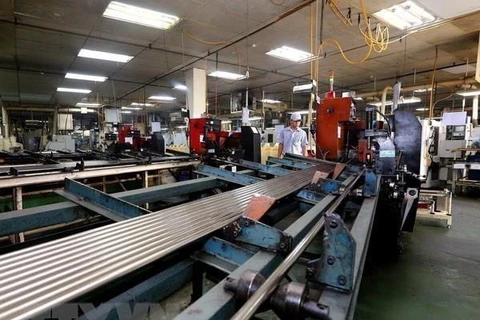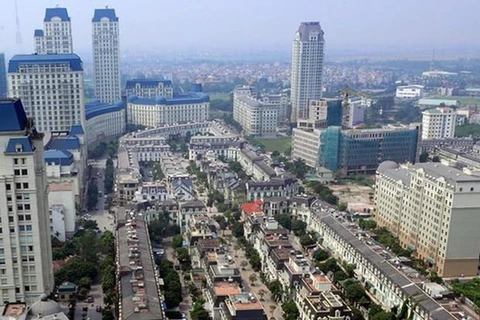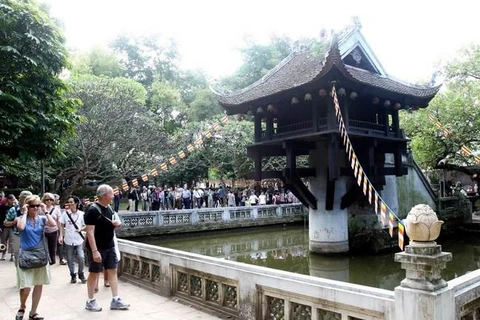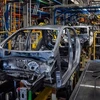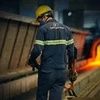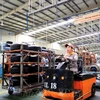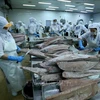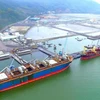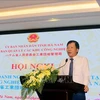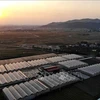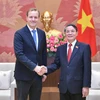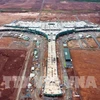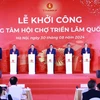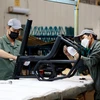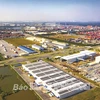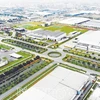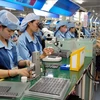Hanoi (VNA) – Hanoi’s efforts to boost economic development have paid off, cementing the capital’s place as an economic locomotive of Vietnam.
Hanoi is not only the political – administrative centre and a major cultural, scientific and educational hub of Vietnam, but also one of the country’s two economic driving forces.
Director of the municipal Department of Planning and Investment Nguyen Manh Quyen said to perform its role, the city has stepped up economic restructuring associated with growth model reform to improve its economy’s quality, effectiveness and competitiveness.
The local economic structure has been shifted in a way that matches the national industrialisation and modernisation process. In particular, the proportion of the service – trade and industry – construction sectors contribute to the regional gross domestic product (GRDP) has increased while that of agriculture has declined.
Notably, Hanoi has chosen tourism to develop into a key sector, Quyen said, adding that it has worked to reform tourism promotion over the last three years, including carrying out a strategic cooperation programme with CNN and attracting more private investment to develop tourism infrastructure and products.
As a result, tourism has recorded the fastest growth rate among the local economic sectors, with its revenue rising some 12.1 percent each year.
Chairman of the municipal People’s Committee Nguyen Duc Chung said Hanoi aims to become a modern city and a major hub in the region, with an annual GRDP growth rate of 8.5 – 9 percent and per capita income of 6,700 – 6,800 USD. To that end, it needs 2.5 – 2.6 quadrillion VND (108 – 112 billion USD) of investment capital between 2016 and 2020, 80 percent of which will come from domestic and foreign investors.
Over the last three years, the capital has built support mechanisms and policies to encourage the private sector’s participation in boosting local development. It has also worked hard to improve its investment climate to become a safe, friendly and effective destination for investors.
By applying information technology, Hanoi has made progress in building e-government to cut the time and costs needed for handling business-related public services. Thanks to that, the time needed to deal with administrative procedures for business registration has been reduced by 30 percent, for investment 60 percent, and for planning 30 – 50 percent, according to Chung.
The improved investment climate has been applauded by the business community. In 2018, the Provincial Competitiveness Index of Hanoi leapt 15 places to ninth position among the country’s 63 provinces and cities.
This favourable environment has helped raise the number of enterprises established in the city since 2016 to almost 93,000 with a combined capital of 280.1 trillion VND, 1.17 times higher than the capital registered between 2011 and 2015.
Additionally, Vietnamese firms have poured 621 trillion VND into the city, which has also attracted 20.28 billion USD in foreign direct investment (FDI) since 2016, rising over three-fold from 2011 – 2015 and making Hanoi the best performer in FDI attraction nationwide.
Chairman Chung noted Hanoi posted average annual economic growth of 7.2 percent between 2016 and 2018. The size of its economy has also expanded, with GRDP hitting 920.27 trillion VND (39.6 billion USD) last year.
Hanoi has also played its role in leading the development of northern provinces and cities, including those in the northern key economic region and the Red River Delta, he said.
It has actively coordinated with other localities in building and implementing socio-economic development plans and boosting their connectivity in multiple spheres, especially trade and tourism.
At a conference in 2018, Hanoi and other northern localities, along with domestic and foreign investors, signed 24 memoranda of understanding on cooperation with estimated total investment of 70 trillion VND (over 3 billion USD) to together resolve the major issues facing the region.
Admitting certain shortcomings in the local economy, municipal authorities said from now to 2025, the capital city will optimise every resource to develop the economic space in its expanded areas, put the Hoa Lac Hi-Tech Park into full operation, modernise economic sectors towards innovation-based growth, and improve its economy’s competitiveness and added value. By doing so, it hopes to better bring into play its role as an economic locomotive of Vietnam./.
Hanoi is not only the political – administrative centre and a major cultural, scientific and educational hub of Vietnam, but also one of the country’s two economic driving forces.
Director of the municipal Department of Planning and Investment Nguyen Manh Quyen said to perform its role, the city has stepped up economic restructuring associated with growth model reform to improve its economy’s quality, effectiveness and competitiveness.
The local economic structure has been shifted in a way that matches the national industrialisation and modernisation process. In particular, the proportion of the service – trade and industry – construction sectors contribute to the regional gross domestic product (GRDP) has increased while that of agriculture has declined.
Notably, Hanoi has chosen tourism to develop into a key sector, Quyen said, adding that it has worked to reform tourism promotion over the last three years, including carrying out a strategic cooperation programme with CNN and attracting more private investment to develop tourism infrastructure and products.
As a result, tourism has recorded the fastest growth rate among the local economic sectors, with its revenue rising some 12.1 percent each year.
Chairman of the municipal People’s Committee Nguyen Duc Chung said Hanoi aims to become a modern city and a major hub in the region, with an annual GRDP growth rate of 8.5 – 9 percent and per capita income of 6,700 – 6,800 USD. To that end, it needs 2.5 – 2.6 quadrillion VND (108 – 112 billion USD) of investment capital between 2016 and 2020, 80 percent of which will come from domestic and foreign investors.
Over the last three years, the capital has built support mechanisms and policies to encourage the private sector’s participation in boosting local development. It has also worked hard to improve its investment climate to become a safe, friendly and effective destination for investors.
By applying information technology, Hanoi has made progress in building e-government to cut the time and costs needed for handling business-related public services. Thanks to that, the time needed to deal with administrative procedures for business registration has been reduced by 30 percent, for investment 60 percent, and for planning 30 – 50 percent, according to Chung.
The improved investment climate has been applauded by the business community. In 2018, the Provincial Competitiveness Index of Hanoi leapt 15 places to ninth position among the country’s 63 provinces and cities.
This favourable environment has helped raise the number of enterprises established in the city since 2016 to almost 93,000 with a combined capital of 280.1 trillion VND, 1.17 times higher than the capital registered between 2011 and 2015.
Additionally, Vietnamese firms have poured 621 trillion VND into the city, which has also attracted 20.28 billion USD in foreign direct investment (FDI) since 2016, rising over three-fold from 2011 – 2015 and making Hanoi the best performer in FDI attraction nationwide.
Chairman Chung noted Hanoi posted average annual economic growth of 7.2 percent between 2016 and 2018. The size of its economy has also expanded, with GRDP hitting 920.27 trillion VND (39.6 billion USD) last year.
Hanoi has also played its role in leading the development of northern provinces and cities, including those in the northern key economic region and the Red River Delta, he said.
It has actively coordinated with other localities in building and implementing socio-economic development plans and boosting their connectivity in multiple spheres, especially trade and tourism.
At a conference in 2018, Hanoi and other northern localities, along with domestic and foreign investors, signed 24 memoranda of understanding on cooperation with estimated total investment of 70 trillion VND (over 3 billion USD) to together resolve the major issues facing the region.
Admitting certain shortcomings in the local economy, municipal authorities said from now to 2025, the capital city will optimise every resource to develop the economic space in its expanded areas, put the Hoa Lac Hi-Tech Park into full operation, modernise economic sectors towards innovation-based growth, and improve its economy’s competitiveness and added value. By doing so, it hopes to better bring into play its role as an economic locomotive of Vietnam./.
VNA


